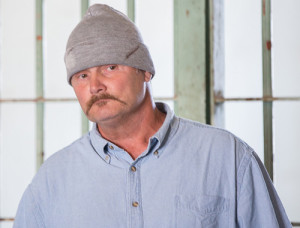by Tim Fitzmaurice
It began in the rather innocuous and studiously unassertive surroundings of a church hall, in Santa Cruz, the kind with folding chairs and a kitchen you can access through a narrow window. It was the Friday performance of the play “In the Kitchen with a Knife.†The bars for the play were wooden, somewhat rocky suggestion for a cellblock, three walls of bars, three benches. The soliloquys were spoken through these wooden bars painted gray. It was delivered to an audience that loved the honesty and the depth of the motives that were presented. All of the actors, men and women, had been confined in some jail or prison. They spoke with the authority they had earned by experience.
But the next day the play was at Alcatraz where, despite the weathered and peeling walls, the bars are real, where, despite the tourists and the smiling rangers, the same cold wind blows that blew for a hundred years of captivity, of punishment. So when Phillip went from the church hall to Alcatraz, it did not matter that the place was now decommissioned, defanged. It was still a prison; Phllip had spent 29 years in prison. So he spoke resolutely after the play that for two hours, the first hours on the Rock, he was paralyzed. He was ill. He felt he was back.

Phillip of Poetic Justice Project, photo by Peter Merts
The prison closed in the 1960’s. But fifty years later it was still an archetype, a symbol of that history and of Phillip’s personal history. He spoke about his passage. He spoke about it with confidence and force. He spoke about his original silence, reticence, fear of speaking in public, a natural consequence of 29 years in prison where silence is a strategy and steely individuality equals safety. To speak out loud is a revolution. Each actor was stepping into a new skin.
Most of all he spoke with gratitude to the people, fellow “ex-convicts,†who had talked him into this unthinkable act—to speak out loud about prison. They were now more than his fellow actors or even his fellow survivors of prison; they were his family. They had insisted upon his resurrection after so many years of incarceration. They had coaxed him and supported him and helped him build a person who now stood in front of an audience of strangers speaking from his heart, showing a rediscovered trust in human kindness and solidarity.
I spoke with him the night before at the church hall. He was just emerging. He said so himself. Each step seemed treacherous. Nothing could be taken for granted. But he spoke to me in a corner of the kitchen. The next afternoon he was speaking to the world. I am not sure how quick transformation happens in life, but this seemed exceptional. It was certainly not as quick as I perceived it. I saw only the superficial. It was the result of rehearsals and many quiet conversations and success, the obvious success of his performances, their performances.
What benefit should a small role in a small play provide? How much can you expect from an earnest effort by amateur actors in a play written by their group? Apparently sometimes you can expect small miracles of human regeneration.
Click here for more on Poetic Justice Project.



I felt incredibly fortunate to have been on “The Rock” that afternoon as Phillip was sharing these reflections. My friends and I were all deeply touched by his willingness to tell us these deep thoughts, and we continue to feel grateful. It was another superlative show, and a profound reflection of the wonderful work being done by the PJP. Thank you so much! BRAVO! Otra! Otra!
I’m very proud to say that Phillip is my nephew and of his accomplishments. He is a super guy and concerned for all. Keep doing your great works ! I’ll be following you along as you go 🙂
Love you